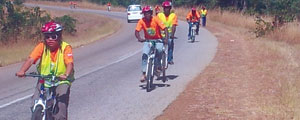
AFTER being drawn from 42 countries around the world, little did they know that their input was going to change people’s lives in marginalised rural communities in Zimbabwe.
Jairos Saunyama
Development Aid from People to People (DAPP) students, who are being trained at Frontline Institute in Shamva, have brought light to marginalised communities through their projects that have been welcomed by many rural people.
DAPP students are involved in the establishment of long-term development projects in Zimbabwe, including education, community development, agriculture, rural development, health (including the fight against HIV/Aids), economic development and environmental conservation.
After learning and acquiring the needed skills, the students will then embark on a mission to impart their skills in the country as well as their home countries.
Chikadzi Village in Mwenezi district is just one of the many villages in the district that DAPP Zimbabwe has targeted with information on the dangers of open defection and the adoption of better sanitation.
DAPP, through the implementation of the Mwenezi Water and Sanitation Programme, is involved in sanitation behaviour change education aimed at decreasing open defecation, while encouraging the building of blair toilets and rehabilitation of boreholes. This initiative has the ultimate goal of stopping the spread of water borne diseases such as cholera and diahorrea.
In an interview with the Frontline Institute principal Luckson Soda, he said that it is the instution’s objective to equip students with the skills needed for community development.
- Chamisa under fire over US$120K donation
- Mavhunga puts DeMbare into Chibuku quarterfinals
- Pension funds bet on Cabora Bassa oilfields
- Councils defy govt fire tender directive
Keep Reading
Soda added that 68 students recently toured Southern Africa on bicycles as a training project for the students.
“Our main objective is to offer the necessary skills to our students for the better of their communities. Recently, the students embarked on a cycling tour of Southern Africa and this was done to as a training project.
“Many areas, especially the marginalised rural areas, are not accessible and many well-wishers usually shun them. So we have trained the students on how to use a bicycle to travel long distances to reach such areas and we are very happy the training went well. “In Zimbabwe, the students cycled for 80km and in Zambia they cycled more than 25 kilometres to remote areas,” he said.
Soda added that this year students have been educating the community on global warming among other issues.
“Everybody is aware about the issue of global warming, but to be honest, the rural folk are not aware of it and it is the responsibility of our students to go and educate them about go ways of preventing the catastrophe.
“This has worked well and people, especially in Shamva and surrounding areas, have welcomed the move to combat global warming,” he said.
In an interview, Noel Buyanga from Zambia, who is a student at Frontline Institute in Shamva, said it is his responsibility to educate the marginalised on impending issue in the world.
“It is a difficult exercise, for example, cycling for 25 to 40 km in an area with hills, but because I need everyone in the world to know about global warming, soil erosion and HIV and AIDS, I have no option but to take on and impart my knowledge.
“I have been to many countries in Southern Africa and I can confirm that there are areas which are not even aware of global warming. So, together with my fellow students, we have been there to teach them of ways of preventing the catastrophe,” he said.
Another student, Sun-silka Nakakuwa from Namibia, echoed the same sentiments.
“Yes, it needs people like us who have the neccesary skills to go into the marginalised world and educate them on what they do not know.
“It is difficult to access the places, but because we are trained to do that we have the means to reach hidden places,” she said. Anna Mhembere from the Magobo area in Shamva hailed the students for their consented efforts in equipping villagers with the needed information.
“They passed through my place last month and taught me a lot of things that I did not know. They taught me about better ways to counter global warming which is threatening human life,” she said.











